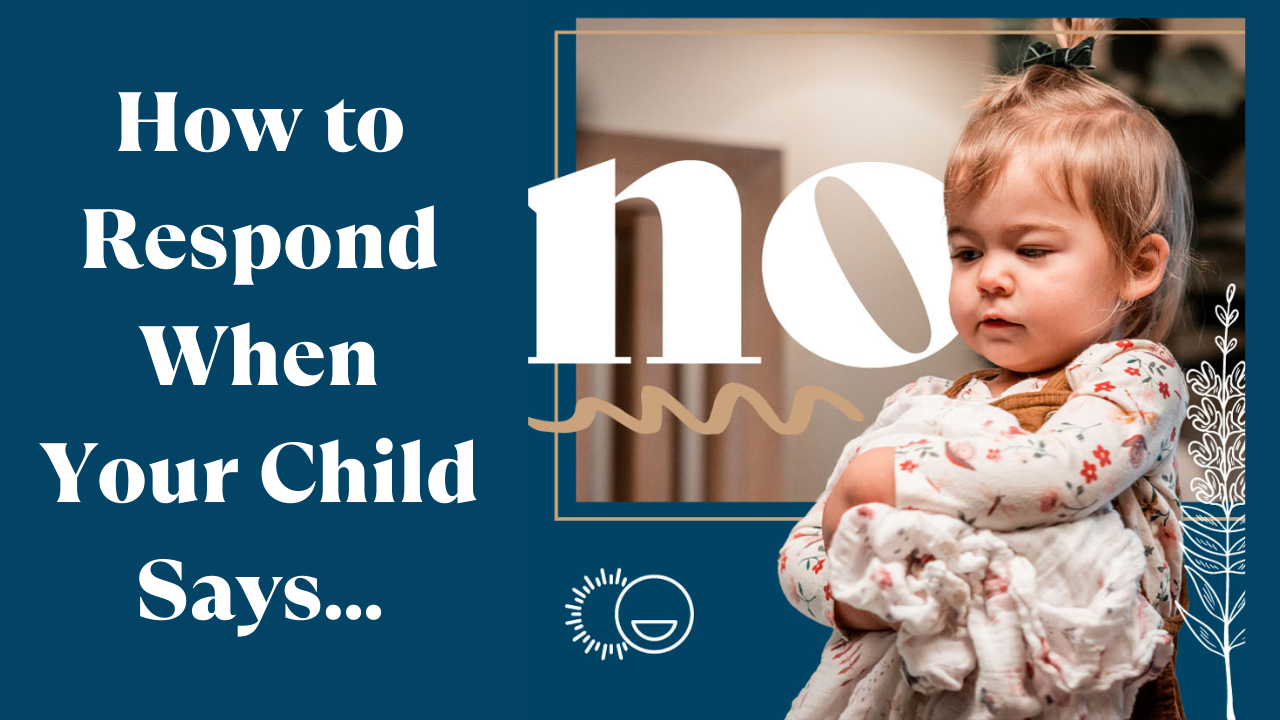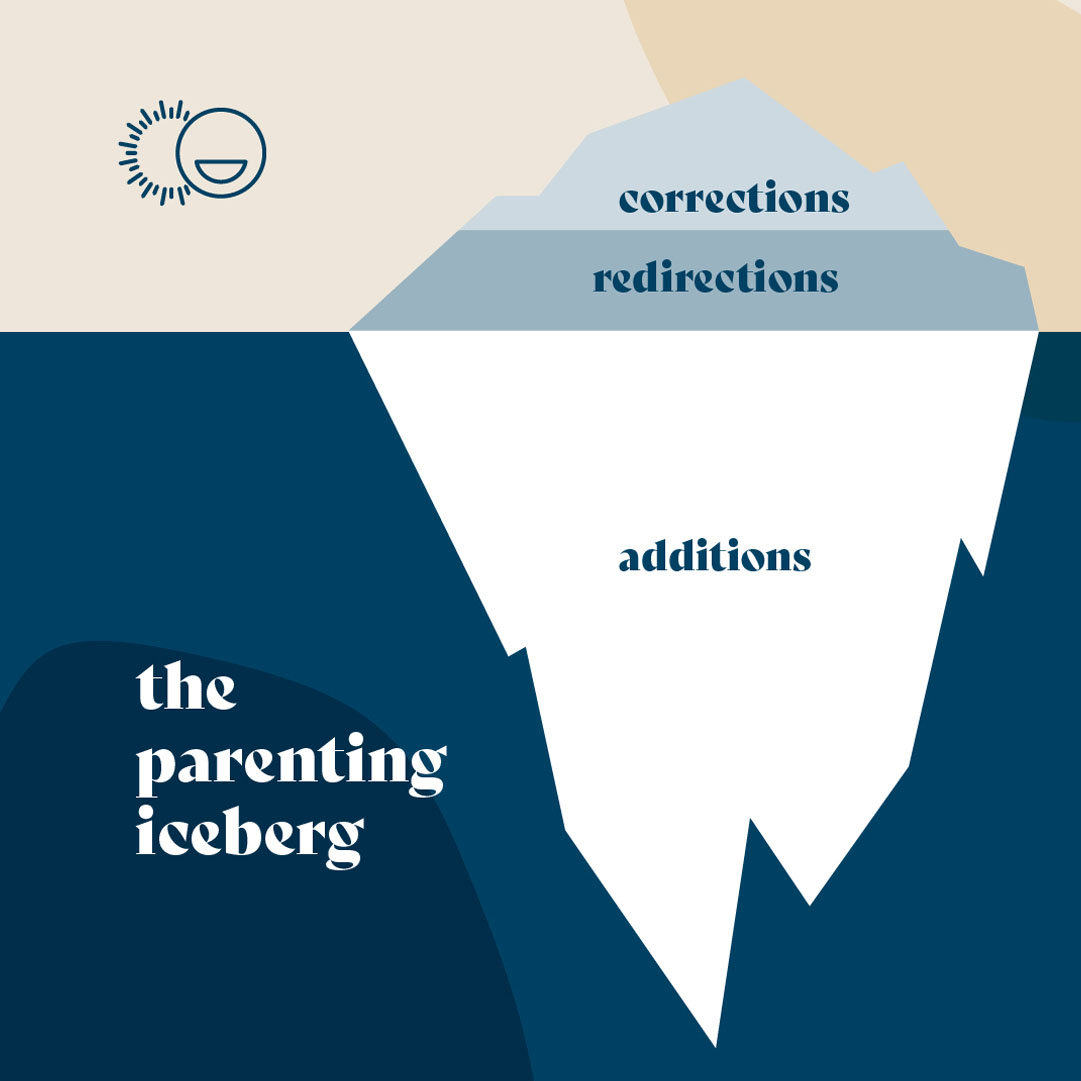What to Do When Your Child Tells You "No!"
Apr 05, 2022
Is there any childhood response quite so infuriating as a bold-faced “no”?
Approximately ten years ago my eldest child told me “no!” for the first time. It’s been a decade, so, I can’t remember the exact details, but it went something like this:
Me: “Lay down, bud, it’s time to change your diaper!”
Him: “NO!” (followed by that sassy toddler Muppet speedwalk, arms flailing, increasing speed, making me look ridiculous trying to catch him….)
It’s amazing how that “no” response is relatively cyclical as well, isn’t it? The toddler years are rife with “no’s,” and then it eases up a little. You might hit a “no” wall again in the midst of late elementary (especially any instance where you ask them to do something while they are mid-video game). Then. The. Teenage. Tears. Hit. The “No” turns into “You can’t tell me what to do!” But the intent is all the same.
It’s no surprise that, “What do I do when my child tells me ‘No’?” is one of our most frequently asked questions! I’m going to address it below. But first I want to back up a little bit.
Most often, we get questions about how to deal with behaviors after they have happened:
“What do I do when my child….
tells me ‘no’?”
hits her brother?”
runs in the street?"
tells me ‘I hate you’?”
doesn’t listen to me?”
has a meltdown when it’s time to leave the park?”
We absolutely can (and will) address what to do when these behaviors occur. However, the truth is: what you do "in the moment" is not as important as what you do in all the moments before and in between!
Think about a star athlete mid-baseball game (I’m not sportsy, so, have grace for this analogy here….). It’s the end of the all-star game, the game is tied, the star athlete just made an amazing play that won the game. Woohoo! Go team! Go #11!
But here’s the thing: that play did make a difference in the game. But it’s not what won the game. What won the game was everything that happened in the months leading up to the game. The practices, the sweat, the refining, the developing of plays, the consistency, the feeding into teammates that trust each other and have each other’s backs. The play mattered, but everything else is what won the game.
It’s the same with parenting. What you do in those hard moments matters. But what REALLY matters is everything you do in the in-between.
We structured our parenting model to mimic the importance of those pre-moment moments. We break down our parenting skills into three sections:
1. Additions: These are things you do every day with your child, regardless of your schedule or your child’s behaviors. These are skills that help meet your child’s needs as humans. Things like attention, control, consistency, being “heard,” having someone you can entrust with your thoughts and feelings. Important stuff that all humans need, but that most children do not have the words to request by name. These skills equate to the baseball practices leading up to the game. Doing these things daily helps quench your child’s needs before problems really arise. These skills take up about 80% of your parental energy.
2. Redirections: These are skills you use as you start to anticipate your child is about to struggle. It’s the equivalent of being up to bat against the hardest pitcher. You know it’s going to be a clench moment, so, you adjust how you bat. In parenting, you know those moments: you are about to cue them that it’s time to leave the park, it’s the end of bath time and they are just having such a great time (and are so very tired), their friend is playing and it’s time for their friend to leave. You know by experience, and by “reading the room,” that a meltdown is eminent. What do you do? You can either ride it out and let the meltdown happen, or, use some quick skills to ward off the meltdown before it ever begins! These moments take up 10% of your parental time and energy.
- Corrections: These are the skills you use after your child does have a hard moment. The opposing team has the bases loaded and just had an amazing hit. What do you do? In parenting, these are ways to stop the behavior and help teach your child what to do next time. The goal here is to always teach a replacement skill, which, will help prevent the behavior in the future. These skills also take up 10% of your parental energy.
We collectively call these skills the “ARC Parenting Iceberg.” If you think of each category as three sections of an iceberg, the “additions” and “redirections” are under the water. Other parents don’t really see you using those skills, even though they are the weightiest and most important. The “corrections” are what we tend to get stuck on and stressed about. That’s what other people see you use when your child is scaling up the tower of monster truck displays in the middle of Walmart. And thus, is what we tend to stay the most focused on, even though, those moments do not matter as much as all the in between moments.

So, let’s apply the question of “What do I do when my child tells me ‘no’?” to the ARC iceberg:
Additions: If “no” is a battle for you, think about what you need to start doing daily to prevent the “no’s.” It’s helpful to think about what your child is needing when they are telling you “no!” Independence? Control? To tell you this thing feels unfair? To avoid the thing they don’t want to do? You may not be able to “meet the need” of avoidance (I mean, if they need their diaper changed, they need their diaper changed). However, you can certainly help them to have a greater sense of independence, more control, and to be able to express their thoughts and feelings. Here is how:
- Give them controlled choices. So many choices. “Would you like eggs or cereal for breakfast?” “Would you like to wear your red shirt or blue shirt?” “Would you like to brush your teeth first or take a bath first?”
- Give them the independence to solve problems. You don’t need to solve every problem for them, let them use the independence they are so desperately striving for. “Well, we need to pick up all of the spaghetti pieces that fell….what’s the best way to do that?”
- Validate their emotions. So often, just being “heard” solves all the problems. “It’s frustrating when I ask you to take out the trash!”
Redirections: You need to tell your child to clean up their trash. You can just feel the “no” coming on. What do you do? Be proactive in *how* you phrase the question.
- Again, give them a controlled choice: “The trash needs to be cleaned up. Do you want to “dunk it” into the trashcan, or try to shoot a 3-pointer?”
- Foreshadow what is coming next: “First clean up the trash, then we will go play outside!”
- Again, validate the emotion: “You are feeling frustrated and a little tired! Clean up your trash, then we can go!”
- Ask, distract, ask: “Throw that in the trash!” [notice the beginning of a meltdown] “Do it like a monkey, ooh ooh, aah aah. That’s right, throw it right here!”
Corrections: It happened. You tried your best, but your child told you no. What do you do now?
- Ignore the “no”. *If* your child told you “no,” but they still did what you asked them to do (hello toddler parents, I’m talking to you), just ignore it. Say, “Thank you for listening to mommy and throwing away your trash!”
- Don’t give power to the “no.” It can be infuriating, but, avoid overreacting. You are then giving power to the “no,” which will make it more likely to occur again. Remember: The “no” doesn’t matter, it’s just a reflection of what they are feeling. What they DO matters.
- Give them a more specific prompt with what you want them to say AND do. “Say, ‘yes ma’am!’ and grab the trash. Great! Now open the lid of the trashcan. Awesome! Throw it in. Thank you!”
- Remind them of your expectations. “In our house, we clean up our trash. Clean it up, then you can go play.”
- AGAIN, validate their experience. “Ah, you do not want to throw away your trash. It’s been a long day, and maybe it feels unfair?”
- Don’t give into the “no.” Your child still needs to do the thing, even if it takes time and patience on your end!
And here is a bonus word of wisdom on your child telling you “no”….don't take it too personally. They are humans, without much control or say over their lives, trying to exert say over the needs they need met so badly.
When my oldest told me “no” with those tiny, defiant, brilliant blue eyes, I had to stifle the anger. How dare he tell me no!? I’m his mother! I am a CHILD PSYCHOLOGIST. Now, when my youngest tells me "no", due to age, experience, and a dash of exhaustion, I have to stifle the laughter. It’s developmental. It’s normal. It’s a little funny….
This post is just the tip of the iceberg (see what I did there?) on what we cover in our ‘Parenting 101’ course. Check it a free video from our course, "Love, Like, Enjoy" here: Watch Free Video from Course
-Dr. Erin Avirett
Want more like this? Transform your home with our Parenting 101 Course, and weekly tips from two Child Psychologists.
Stay connected with news and updates!
Join our mailing list to receive the latest news and updates from Mind + Child.
Don't worry, your information will not be shared.
We hate SPAM. We will never sell your information, for any reason.



